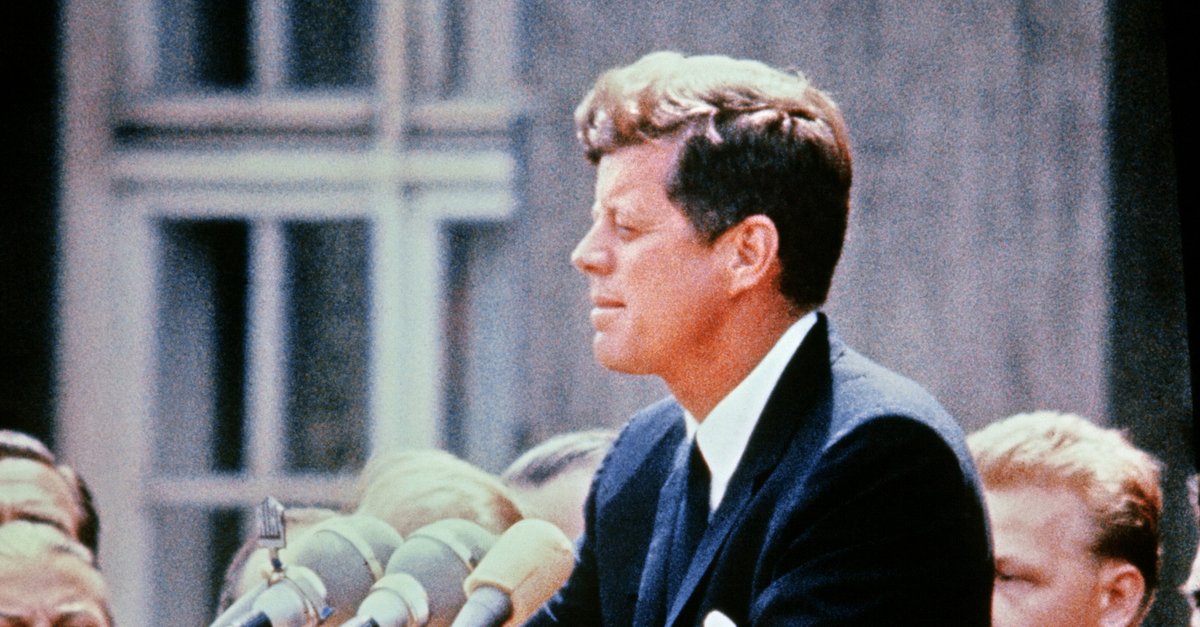
John Fitzgerald Kennedy giving a speech in 1957.
California researchers with a non-profit organization sued President Joe Biden and the National Archives Wednesday, claiming that the federal government has illegally withheld the disclosure of documents related to the 1963 assassination of President John F. Kennedy.
The Mary Ferrell Foundation (MFF), a Massachusetts-based corporation whose researchers live in California, aims “to bring accessible and interactive history to a new generation of critical thinkers.” As part of the foundation’s work, it maintains large digital archives of the Watergate scandal, and Kennedy’s assassination. The foundation’s namesake, Mary Ferrell, was a renowned historical researcher who specialized in the Kennedy assassination.
In the lawsuit, MFF says it maintains “the largest searchable electronic collection of materials related to the JFK assassination including Assassination Records, documents, government reports and online books totaling nearly two million pages,” and that as a result of the extensive nature of its collection, the MFF is the go-to source for historical records within its subject matter.
MFF, together with researchers Josiah Thompson and Gary Aguilar, filed a lawsuit in federal court in California. The plaintiffs seeking declaratory relief and injunctive relief, as well as a writ of mandamus to compel Biden and the National Archives and Records Administration (“NARA”) to fulfill their duties under the John F. Kennedy Assassination Records Collection Act of 1992 (the “JFK Records Act”).
The lawsuit claims that the federal government has withheld and unnecessarily redacted records concerning Kennedy’s assassination in contravention of the JFK Records Act.
The JFK Records Act was signed into law in 1992 by then-president George H.W. Bush. MFF’s complaint points to the act’s legislative history, which included Congress’ reasoning behind the law. Per the complaint:
Congress said “Continued, unjustified secrecy increases those doubts and speculation, and fuels a growing distrust in the institutions of government . . . . prompt disclosure of all records relating to the assassination is the best way to fulfill the American people’s right to know what happened to their President.”14 [emphasis added] 23. In passing the JFK Records Act, Congress found and declared that the “legislation is necessary to create an enforceable, independent, and accountable process for the public disclosure of such [assassination] records.” 15 [emphasis added]. 24. Congress concluded that the Act was necessary because the Freedom of Information Act (“FOIA”)16 and Executive Order 1235617 as administered by the Executive Branch had “prevented the timely public disclosure of records relating to the assassination of President John F. Kennedy.”18 [Emphasis Added].
The complaint explained that once the act was passed, “Congress directed government offices that records relating to the assassination would ‘carry a presumption of immediate disclosure'” and that given that three decades had passed since the assassination, “only in the rarest of cases is there any legitimate need for continued protection.”
Perhaps most significantly, the JFK Records Act required all records about the JFK assassination to be publicly disclosed in full no later than October 26, 2017.
The day before the October 2017 deadline, then-President Donald Trump issued a memorandum instructing National Archives to postpone the public disclosure of some of the assassination records for six months. The following April, Trump issued a second memorandum, this time instructing NARA to further postpone disclosure for an additional three and a half years.
When Biden took office, he issued an executive memorandum on October 22, 2021 that instructed NARA to further postpone release of an unspecified number documents. The plaintiffs assert that in creating this delay, Biden breached his duty by failing to adequately justify the postponement.
The plaintiffs say among the tens of thousands of documents improperly kept secret were CIA files and surveillance tapes, including conversations recorded by the FBI between New Orleans crime boss Carlos Marcello and his cellmate, Jack Van Laningham, in which Marcello told Van Laningham that he was involved in JFK’s assassination.
The plaintiffs claim that they have been harmed by the government’s failure to release the documents in that MFF was forced “to divert resources from its core mission and instead devote time analyzing which Assassination Records were partially redacted or withheld in full by the unlawful Biden Memo.” Further, they argue that NARA acted “arbitrarily and capriciously” and violated the Administrative Procedure Act by shirking their own legal duties under the JFK Records Act.
The plaintiffs seek a court order declaring that Biden’s memorandum violates the JFK Records Act, as well as an order that Biden and NARA give proper reasoning for any continued failure to disclose records.
In a statement posted to its website, MFF said that the government’s failure to release documents has caused “confusion, gaps in the records, over-classification, and outright denial of thousands of assassination-related files, five years after the law’s deadline for full disclosure.”
[image via Stringer/AFP via Getty Images]
Have a tip we should know? [email protected]